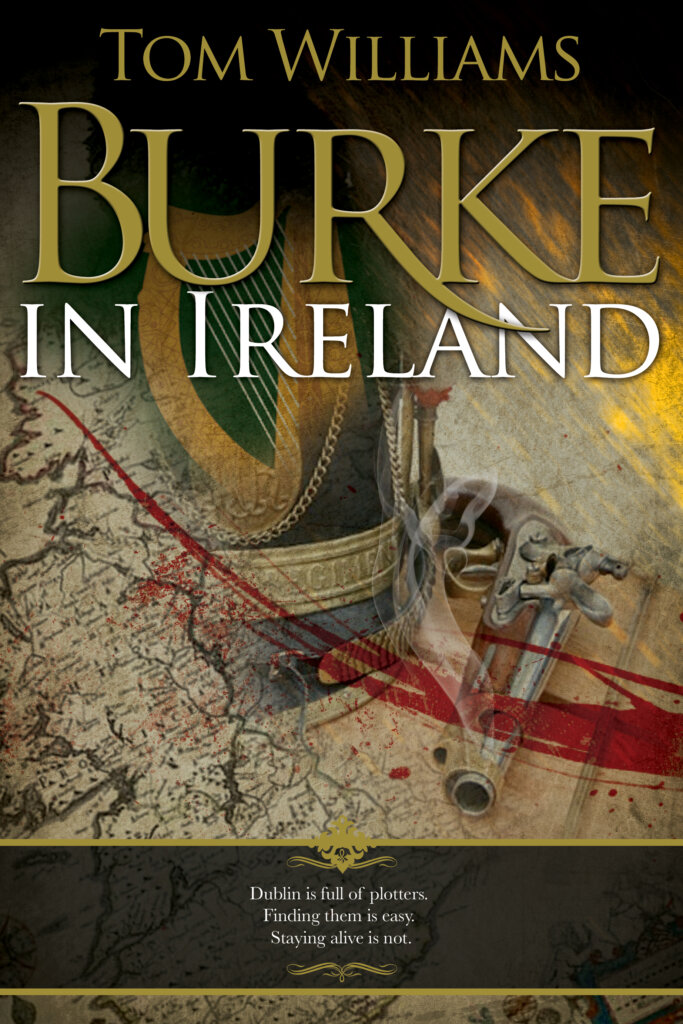Burke and the Lines of Torres Vedras, the latest book in the James Burke series will be published on Kindle on 7 April and it is already available for pre-order. The paperback will be along soon. Somebody contacted me to ask how it fitted in with the others in the series. The answer is that it follows directly from Burke and the Pimpernel Affair. It starts with Burke back in London, suspended from active duty because of the leg injury he sustained in Paris. He’s soon back in the field though, returning to the Peninsula, though this time attached to the Portuguese army headquarters in Lisbon.

The beginning of all the Burke books now has a potted history of his career. It has grown a bit since I started doing it. Here’s the latest version (and, yes, his name really was Florence):
JAMES FLORENCE BURKE
Born Ireland 1771
Enlisted Regiment of Dillon (France). Saw active service in Sainte Domingue. Surrendered to British in 1793. Detached for special duties at the War Office
1793/4: confidential duties in Ireland
1798: confidential duties in Egypt
1805: confidential duties in Argentina
1806: attached to British forces in Buenos Aires
1806: promoted to Captain
1807: confidential mission to the Spanish court
1808: promoted to Major
1808: diplomatic posting to Brazil
1809: diplomatic posting to Argentina
1809: attached to General Hill in Spain
1809: confidential work in France
1810: attached to General Beresford’s staff in Lisbon
1815: confidential work with Allied occupation forces in Paris
1815: attached to the Hussars of Croy. Saw action at Waterloo
The books dart around his career a bit. His service from 1805 to 1809 is covered in Burke in the Land of Silver, which also explains how his military career started in Sainte Domingue. Ireland is in Burke in Ireland (the fourth book published), Egypt in Burke and the Bedouin (#2 in the series) and his adventures in 1815 are Burke at Waterloo. The other three books, though, form a continuous narrative starting immediately after his return to England after his efforts in Argentina. He fights with General Hill in the Peninsular War before being sent to Paris to foil the plots of the ghastly Fouché. (Fouché was a real man and every bit as unpleasant as he is painted in the book.) Having survived Paris, he’s back in the Peninsula, hunting down spies in Lisbon.
Thanks to Bernard Cornwell’s efforts with Richard Sharpe, there is an apparently unending demand for stories set in the Peninsular War (Burke in the Peninsula is the most successful of the series) so I’m hoping that Burke and the Lines of Torres Vedras will do well. The Lines (a string of forts that ran from the Atlantic to the River Tagus) are a fascinating bit of Peninsular War history and should satisfy military history junkies. (I’ve blogged here about the Lines recently.)
My books are, I’m told, shorter than many historical novels. Readers who like to lose themselves in a long historical story could buy Peninsula, Pimpernel and Torres Vedras and read them straight through, which should satisfy the most ardent enthusiast of the long read.
The Burke books are definitely a series and not a serial. Not only does each stand alone, but I enjoy playing with slightly different styles within the genre. So Burke in the Land of Silver is straightforward historical fiction, closely based on the adventures of the real James Burke. Burke and the Bedouin, although sticking to the historical facts of Napoleon’s invasion of Egypt, is a romantic romp, featuring a beautiful woman in need of rescue and midnight rides across the desert. Burke at Waterloo is part spy story (based around a real attempt on Wellington’s life) and part a classic war story with the climax on the field at Waterloo.
Burke in Ireland is far and away the darkest of the Burke books. It’s the story of his first mission for British military intelligence and go some way to explain his cynicism in the later adventures. I hadn’t intended to write such a gloomy novel, but the English behaved very badly in Ireland and the tone reflects the reality of what was essentially a military occupation.

Burke in the Peninsula is a fairly straightforward war story. It shows two sides of the war in Spain, with Burke fighting alongside the guerrillas while William Brown serves at the Battle of Talavera.

Burke and the Pimpernel Affair, by contrast, is escapist fun, loosely inspired by Baroness Orczy’s classic Pimpernel stories. Burke ducks and weaves through Paris, freeing prisoners from a French dungeon and dallying with the Empress Josephine herself in a story that turned out to contain much more historical fact than I intended. (The real James Burke did infiltrate Napoleon’s court, although not in 1809.)

And now we’re back in the Peninsula, hunting down spies in best James Bond style while also getting up close to one of the greatest feats of military engineering until the construction of the Maginot Line in the 20th century. (And, unlike the Maginot Line, the Lines of Torres Vedras kept the enemy out until the war was over.)
Seven books, all different in their way but all filled with a mix of historical fact and swashbuckling fun. Why not read them all?
